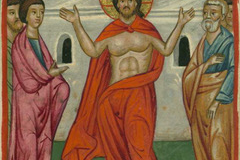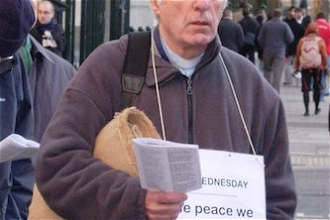Westminster conference told: 'all faiths need new ways to reach young people'
All faiths need to find new ways to reach out to young people in a changed world and abandon the old hierarchies, Jean Marie Gaudeul, adviser to the French Bishops Conference on Islamic relations, told a packed audience at Westminster Cathedral Hall on Thursday. Dr Gaudeul was the keynote speaker at a two day inter-faith conference to mark the fortieth anniversary of the Second Vatican Council's Declaration on the Church's relations with other religions, Nostra Aetate. He told delegates that the recent troubles in France demonstrated how the old cultural hierarchies were disappearing with young people no longer automatically adopting their parents' beliefs. Individuals were now choosing their own path, rather than having their choice pre-determined by society and institutions. This individualisation of belief means that communities are no longer based on traditional concepts of religious authority, Dr Gaudeul told delegates, with young people increasingly rejecting prescriptive religion. This "privatisation" of religious affiliation goes hand-in-hand with the democratisation of religious belief, he said, which has seen the gap close between the clerics and the laity. "In the face of the empowerment of this adult "laity", the great religions are rediscovering, in a new way, that all religious institutions are at the service of the faith, and not the opposite. Religion is made for man and not man for religion," said Dr Gaudeul. "Believers are now moving away from a simple adherence to religious authorities with competence based on study and towards claiming a competence from the experience of life in a modern world. Accepted doctrine is giving way to a la carte religion. "It is becoming impossible to build a life together based on the rules transmitted by a religious tradition in a distant past. It has even become impossible to base oneself on the data of a single religious tradition: whether one regrets this or rejoices about it, all human beings will have their word to say on these matters. No peoples, no individuals will be able to isolate themselves, as in a vacuum, to find an answer to these problems," said Dr Gaudeul and, he added 'For the great religions, as for all Societies, teaching must become witnessing, or it will not work' "The answer to the problems of the modern world lies in a church meeting the needs of people, where the emphasis is not on points of doctrine but on action in the world, and on inter-faith dialogue. A new language needs to replace the dogma of the past, when different religions confronted each other without any possibility of compromise. All religions face the same challenges: the struggle against poverty, suffering, under-development, oppression etc and all religions are finding common ground based on the ethical values at their core. "This inter-faith dialogue to find common ground may lead to the discovery of many common points, such as the sense of God's presence, adoration, praise, thankfulness, humility, prayer, repentance, efforts at self-amendment, etc "We need not attempt to set our own faith in opposition to theirs. In line with Nostra Aetate, we may find, on the contrary, that their witness reminds us of God's call as experienced in Christianity. Their witness is an incentive to us to be better believers," said Mr Gaudeul. "If there is a purpose to interfaith dialogue, it might be that at the end of our encounters, God may be loved better. Is not that the content of the prayer left to us by Jesus: Hallowed be thy Name, thy kingdom come, thy will be done? This, of course goes both ways: in meeting people of other faiths, we may call one another's attention to God's voice as He guides each human being in the secret of his or her heart." Archbishop Kevin McDonald, Chairman of Committee for Other Faiths and Committee for Catholic-Jewish Relations, closed the conference with the message that inter-religious Dialogue is now an integral part of life in the Church. He said Christianity was a religion of dialogue which called on all Christians reach out to those of other religions, to establish shared values and create new bonds of friendship with them. "This is an urgent task especially in a time of ethnic conflicts that have a religious dimension to them," said Archbishop McDonald. "Dialogue is integral to Christianity. Interreligious dialogue is dialogue between people of prayer. We should pray for one another and at some level we pray in solidarity with one another. The two meetings at Assisi, when Pope John Paul called people of different religions to come together to pray for peace, remain an icon and a model for what we can do in this area. Respecting and encouraging each other in prayer but from the vantage point of our own faith and the prayer that flows from that. As was said of the first Assisi Day, we don't come to pray together. We come together to pray." Source: CCN


















